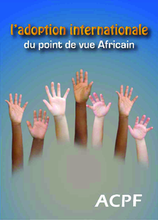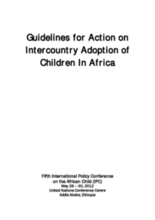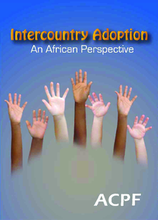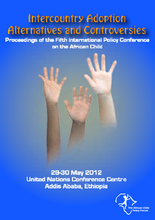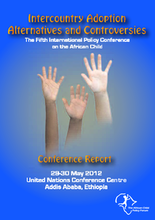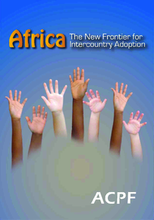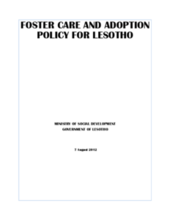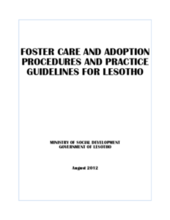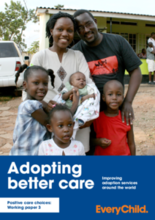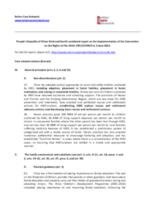Displaying 571 - 580 of 661
This publication, published in French, was prepared as a background document to inform the discussions and debates during the Fifth International Policy Conference on the African Child held on 29-30 May 2012 in Addis Ababa, Ethiopia. This report examines the rationale behind increasing intercountry adoption in Africa, the main thrust of international standards, the extent and magnitude of African intercountry adoption and its problems and challenges. The paper provides recommendations to this increasing trend and aims to establish a more Pan-African position on the topic of intercountry adoption.
The Guidelines for Action on Intercountry Adoption of Children in Africa was adopted at the Fifth International Policy Conference on the African Child held on 29-30 May 2012 in Addis Ababa, Ethiopia. The objectives of the Guidelines are to facilitate and support the efforts of States to take all appropriate legal, administrative, and other measures to ensure that all persons and organizations involved in the adoption of a child act in conformity with applicable international legal instruments. Recommendations are set forth for central authorities and accredited bodies.
This publication was prepared as a background document to inform the discussions and debates during the Fifth International Policy Conference on the African Child held on 29-30 May 2012 in Addis Ababa, Ethiopia. This report examines the rationale behind increasing intercountry adoption in Africa, the main thrust of international standards, the extent and magnitude of African intercountry adoption and its problems and challenges. The paper provides recommendations to this increasing trend and aims to establish a more Pan-African position on the topic of intercountry adoption.
The Proceedings report presents summaries of all presentations delivered and of all plenary discussions held during each session of the Fifth International Policy Conference on the African Child (IPC) held on 29 and 30 May 2012 in Addis Ababa, Ethiopia, which brought together experts, policymakers, and key stakeholders to discuss various issues and the implications of intercountry adoption in Africa.
This document provides an overview of The Fifth International Policy Conference on the African Child held on 29-30 May 2012 at the United Nations Conference Center Addis Ababa, Ethiopia. The overall goal of the Fifth IPC was to further the discussion on intercountry adoption and to contribute to the improvement of national laws, policies, systems and procedures relating to intercountry adoption.
This publication was prepared as a background document to inform the discussions and debates during the Fifth International Policy Conference on the African Child held on 29-30 May 2012 in Addis Ababa, Ethiopia. This report provides a situational analysis of the law and practice of intercountry adoption in Africa, with the aim of informing debate on conceptualizing, developing and implementing policies, laws, and programs and research in relation to intercountry adoption in Africa.
A document containing the policy for foster care and adoption in Lesotho.
This document contains the Procedures and Practice Guidelines for Foster Care and Adoption in Lesotho.
In the third edition of EveryChild’s working paper series, Positive Choices, the practices of domestic and inter-country adoption are examined. The paper aims to explore why adoption is so rarely used globally, and to examine whether or not an expansion of adoption services could offer a potential solution to the millions of children around the world in need of permanent care and currently languishing in harmful institutions.
The People’s Republic of China issued its third and fourth combined report on the implementation of the Convention on the Rights of the Child in June 2012. This extract of the report focuses on sections relevant to children's care and in particular those addressing Family Environment and Alternative Care

